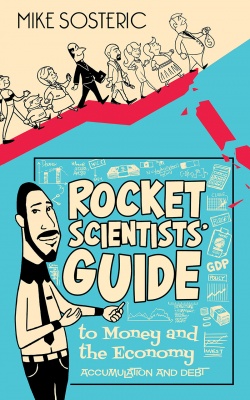The System: Difference between revisions
An Avatar.Global Resource
| Line 14: | Line 14: | ||
==Notes== | ==Notes== | ||
An excellent overview of how the rich rig The System to benefit them is provided by economics Dean Beaker.<ref>Baker, Dean. Rigged: How Globalization and the Rules of the Modern Economy Were Structures to Make the Rich Richer. Washington, DC: Center for Economic and Policy Research, 2016. https://deanbaker.net/images/stories/documents/Rigged.pdf.</ref> | |||
Ruyle uses the phrase [[Mode of Exploitation]] to refer to The System. Ruyle breaks the mode of exploitation down into three interrelated systems, Exploitative Techniques, Mechanism of Force, and Ideological Institutions. Each of these systems work together to enable and propagate the exploitation fo the masses. His schema is a useful wayt to conceptualize the system. | Ruyle uses the phrase [[Mode of Exploitation]] to refer to The System. Ruyle breaks the mode of exploitation down into three interrelated systems, Exploitative Techniques, Mechanism of Force, and Ideological Institutions. Each of these systems work together to enable and propagate the exploitation fo the masses. His schema is a useful wayt to conceptualize the system. | ||
Revision as of 16:16, 12 November 2020
The System
The System (a.k.a. the Regime of Accumulation, a.k.a. Mode of Exploitation) refers to the legal, political, educational, police/military, and ideological systems tasked with enabling the economic and sexual exploitation of the masses, and with propagating and maintaining a particular exploitative world order.
Syncretic Terms
The System > Mode of Exploitation, Old World, The Machine, The Matrix, The Wheel
Related Terms
The System > Economic Class, Exploitation, Ideology, Karl Marx, Maya, Money, Neurodecolonization, Proletariat, The Pyramid
Notes
An excellent overview of how the rich rig The System to benefit them is provided by economics Dean Beaker.[1]
Ruyle uses the phrase Mode of Exploitation to refer to The System. Ruyle breaks the mode of exploitation down into three interrelated systems, Exploitative Techniques, Mechanism of Force, and Ideological Institutions. Each of these systems work together to enable and propagate the exploitation fo the masses. His schema is a useful wayt to conceptualize the system.
The System encourages compliance and violence: Zimbardo, of Stanford Prison Experiment fame, speaks of a part of the System that aims at encouraging people towards compliance and violence. "However, I would have missed the big picture, the bigger power for creating evil out of good—that of the System, the complex of powerful forces that create the Situation."[2] His book details the forces that cause good people to do bad things.
Zimbardo notes, in the case of Nazis and their mass murder, that getting people to do evil things involves casting the opponent as an evil enemy, and then giving official "permission" to carry out sadistic acts. [3]. The tools for labelling others as evil enemies, and the ideological underpinning that facilitates permission, can be found in the Old Energy Creation Template
The current, Stage Five system is a Capitalist Regime of Accumulation. [4]. In order for the planet to move on to Stage Seven, the Regime of Accumulation must be replaced with a Regime of Distribution that fairly and sustainably distributes the planet's bounty.
This meme from Reddit sums it up quite nicely. https://www.reddit.com/r/antiwork/comments/jm0b0v/2real4me/
For more on the current Regime of Accumulation, read

Citation and Legal
Treat the SpiritWiki as an open-access online monograph or structured textbook. You may freely use information in the SpiritWiki; however, attribution, citation, and/or direct linking are ethically required.
Footnotes
- ↑ Baker, Dean. Rigged: How Globalization and the Rules of the Modern Economy Were Structures to Make the Rich Richer. Washington, DC: Center for Economic and Policy Research, 2016. https://deanbaker.net/images/stories/documents/Rigged.pdf.
- ↑ Zimbardo, Philip. The Lucifer Effect: Understanding How Good People Turn Evil. New York: Random House, 2007.
- ↑ Zimbardo, Philip. The Lucifer Effect: Understanding How Good People Turn Evil. New York: Random House, 2007.
- ↑ Sosteric. Rocket Scientists’ Guide to Money and the Economy: Accumulation and Debt. St Albert, Alberta: Lightning Path Press., 2016.
